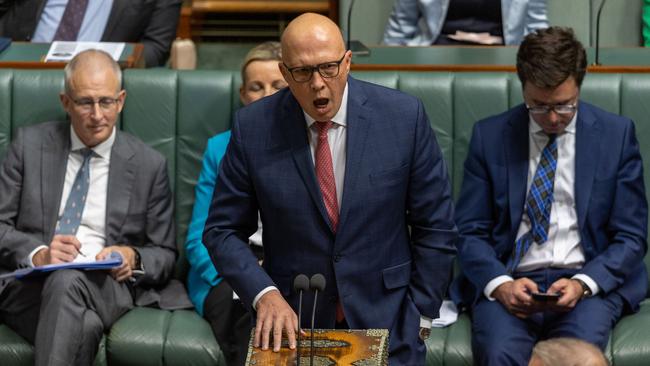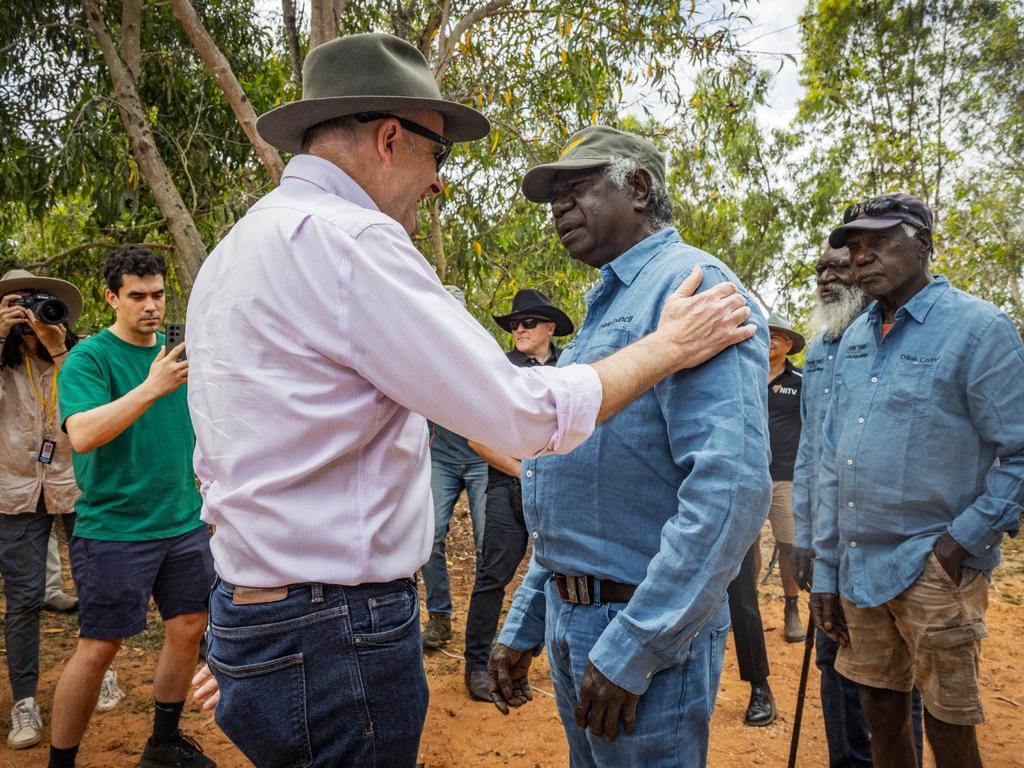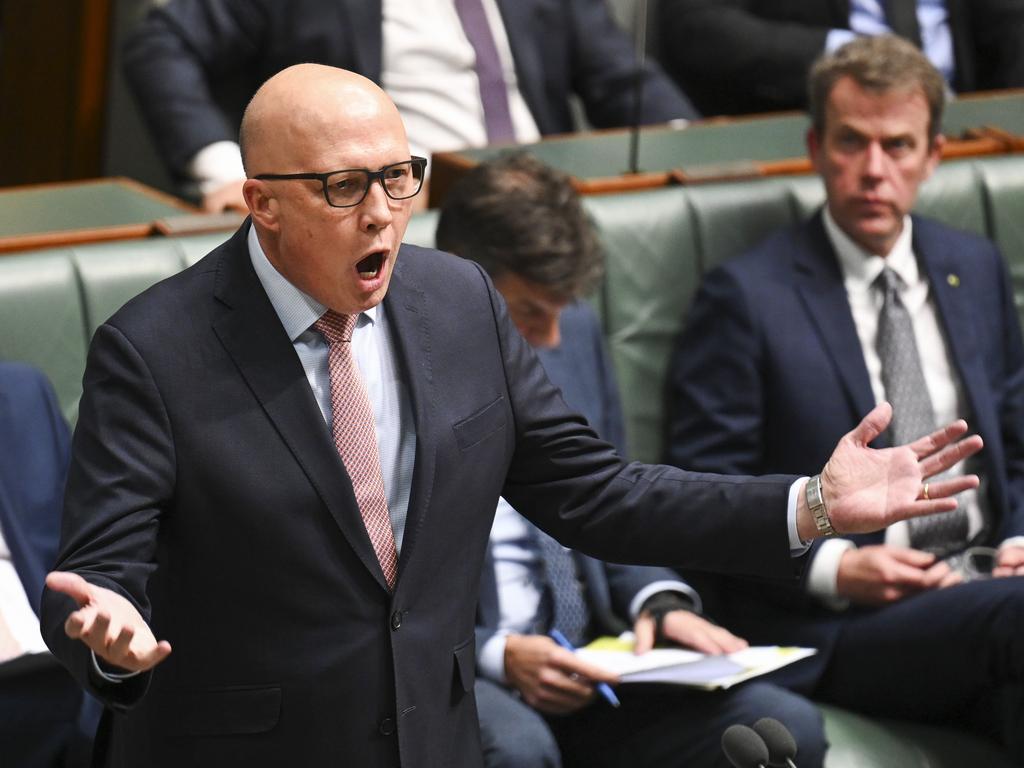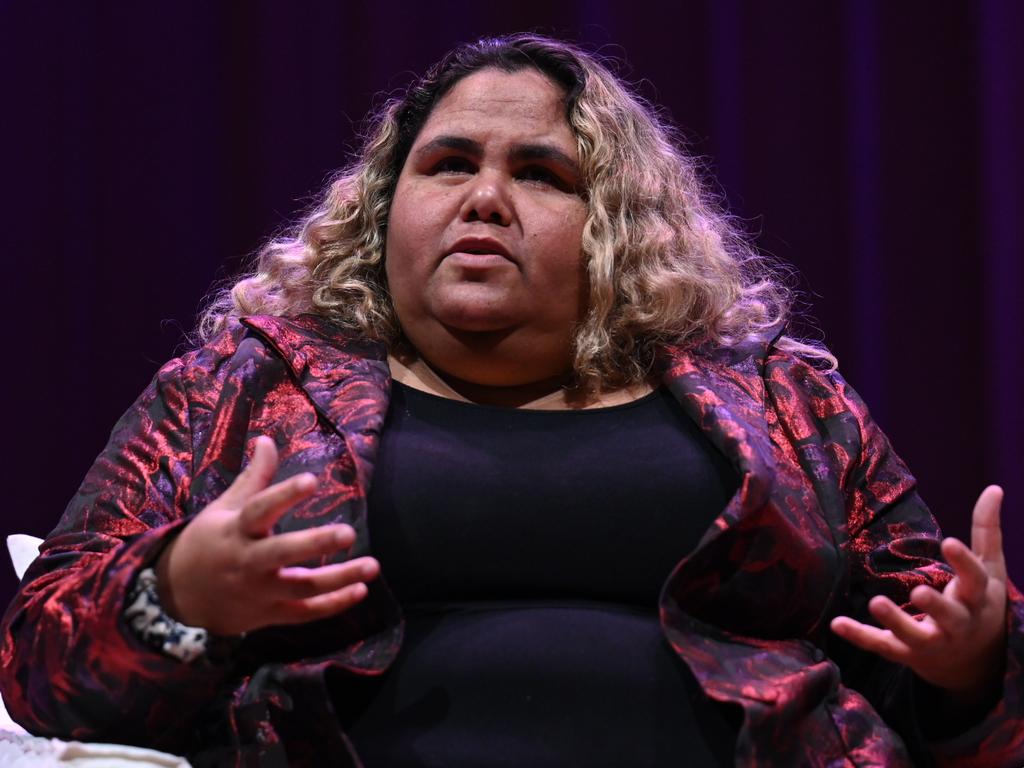Attacks on the Indigenous voice to parliament an ugly attempt to wound Anthony Albanese
It is not difficult to see how a No victory might hurt Anthony Albanese to some degree, but would it be a victory for anyone?

It is that ugly. It is that cynical.
Brutal politicking is nothing new and Labor, least of all, can quibble with such ruthless calculations. We are still dealing with the fallout from its weaponisation against Scott Morrison of the Brittany Higgins rape allegations.
Yet think of what the Coalition might willingly trash in its hard-hearted ploy to take some bark off Anthony Albanese. Decades of Indigenous advocacy and consultation, including by Coalition governments, driven by the noblest of intentions, are being disrespected.
Imperilling reconciliation for partisan advantage is hardcore. Yet this week the opposition led question time with scares about the voice and attempted to censure the Prime Minister, accusing him of running a secret agenda to undermine the nation’s future.
Peter Dutton labelled Albanese “duplicitous” and accused him of “deliberately and willingly withholding information” from voters and “seeking to divide his nation” with the voice. As policy attacks go, this is barking mad.
We are talking about a government putting a referendum to the people to enact a reform designed to unify the nation and eradicate discrimination, a reform devised by Indigenous representatives, constitutional experts and politicians of all stripes across two decades of consultation under the imprimatur of Coalition and Labor governments. Yet now the Coalition scare campaign seeks to decry this as a secretive plot to rend asunder the nation.
It is not a plausible critique and it should not be taken seriously by media or political commentators. It insults the public.
This is not to say that Albanese has not made mistakes or that there are not reasonable arguments to be made against the voice. It is just that the No campaigners seem unconvinced by their rational criticisms, so they constantly ramp up wild fears.
They find every example of overclaiming by Aboriginal activists or overreach by state governments and use it as evidence against the voice, even though these things are happening in a voice void. The cultural heritage mess in Western Australia, the extremist claims for reparations and the ongoing resistance to Australia Day – they are all happening now and will continue with or without a voice.
The tactic of recruiting every Indigenous dispute as evidence of the chaos a voice will inflict is particularly nasty. It insinuates the future prosperity of the non-Indigenous 97 per cent of this nation is under threat from our most disadvantaged cohort.
This is a grotesque mischaracterisation. No campaigners are attempting to convince voters that they have something materially to fear from a voice.
The people running these scares know full well they are talking about nothing more than an advisory body. They know governments, parliaments and the rule of law will be unimpeded by a voice that can wield no power except the power of its ideas.
This truly is an attempt to turn Australians against each other. And in large part it is motivated not by a concern about the actual reform but by a visceral desire to get Albo, to get Labor. (I would have thought energy policies and the cost of living might provide ample opportunities to do that.)
The truth is that as debates about treaty, Australia Day and cultural heritage continue, the formation of a truly representative, grassroots Indigenous body should help to resolve them reasonably. In the real world of political/public debate, the voice will be accountable for the quality of its own recommendations; good advice will carry weight and any advice that is beyond the pale will be all too easily ignored, undermining the voice’s authority.
This is the accountability and personal responsibility aspect of the voice that is fundamentally conservative – the reason extremists such as Lidia Thorpe oppose the idea.
No campaigners continually broaden the arguments for voting against the voice. Voters who do not like welcomes to country or Indigenous placenames are being urged to express their dismay by rejecting the voice – this threatens to turn the No case into a visceral anti-Indigenous exercise. The Coalition is even roping in the cost of living, urging voters to see the voice as an expression of Labor’s disdain for their family budget pressures.
This is dastardly and clever politics that could hurt Labor. But it is harming the nation, too.
On the back of the Opposition Leader’s censure motion where he pleaded for constitutional recognition without a voice, Nationals leader David Littleproud declared in true “us and them” terms that he knew of a better way to empower Indigenous communities. “This is about making sure Canberra goes to them,” he said, “not having them come to Canberra.”
This displayed inexplicable ignorance or blatant condescension because, from John Howard onwards, our prime ministers and governments have worked with Indigenous leaders to find the best way to deliver the bipartisan goal of constitutional recognition.
The voice was the culmination of this process, a neat way to deliver practical rather than merely symbolic recognition and help guard against further mistreatment under our Constitution.
It was endorsed by Indigenous leaders at Uluru in 2017 when the Coalition was in power. It is breathtaking that non-Indigenous Coalition politicians now would seek to sweep this aside and say they know better.
Common decency and personal respect demand the No campaigners do better. In this climate, and with this historic reform up for consideration, the Coalition has effectively boycotted this weekend’s Garma Festival – no frontbencher will attend.
Dutton admits he made a mistake boycotting the national apology in 2008. Yet 15 years later there is a lack of empathy in the Coalition approach on the voice.
There is no doubt the Yes case has been poorly argued. Indigenous Australians Minister Linda Burney barely sticks to a script and shows no capacity to rebut criticisms or fashion arguments on the run.
Albanese has stubbornly resisted getting into the nitty-gritty of explaining how the voice will operate in practical terms because he wants to stay above the fray. That will not cut it; he needs to be the lead advocate, the furphies must be refuted and, while the cries for more detail are largely disingenuous, voters are entitled to hear more about the basic principles.
The most legitimate arguments against the voice include the constitutional risk, explored most assiduously by Janet Albrechtsen in these pages. This is an important area for examination.
Still, I would argue it has been well and truly put to bed because from the inception the designers of the voice have been alive to the challenge. The wording was drafted with input from a broad range of high-level constitutional experts.
With a couple of former chief justices of the High Court, the Solicitor-General and most legal experts ticking off on the current wording, it is hard to undermine the voice with a handful of legal dissenters.
The other strong anti-voice argument, especially from a conservative point of the view, is the fact it creates additional bureaucracy and bigger government.
Senator Jacinta Nampijinpa Price has been the leading proponent on this score. It is a reasonable concern, but in the end governments need to shape the voice in ways that guard against this – besides, the potential benefits outweigh these relatively mundane risks.
As I have pointed out previously in these pages and on Sky News, the Coalition attack is undermined by its own commitment to legislate a voice.
How can it argue a voice would not provide useful advice when it says it will legislate one itself to do just that?
How can it say a voice will gum up the processes of government or be unfair to non-Indigenous Australians when it plans to legislate a voice? And most crucial of all, how can it possibly suggest a voice would be racially divisive when it says it will legislate a voice itself?
It was encouraging to hear Albanese make these points in parliament this week. He needs to push back against endless voice fearmongering.
Coalition MPs pretend to be desperate for detail but in their last term of government under Scott Morrison they compiled a 275-page report, based on extensive national consultation, about what a legislated voice would look like. (I was part of that process.) They know more than they pretend.
In a culture where politicians, journalists and voters often cannot think beyond the next tweet, let alone the daily news cycle, we need to consider thousands of years of Indigenous history, a couple of centuries of European settlement, and cast our minds forward at least three months to the Sunday morning coming down after the referendum. It is not difficult to see how a No victory might wound the Prime Minister to some degree, but would it be a victory for anyone?
Would it elevate Dutton or save Australia from some terrible fate? Or would it diminish the nation, by thwarting Indigenous aspiration and damaging the project of reconciliation?
I fear a vast, open and optimistic country will have shrunk overnight; shrivelled like a billabong in a drought.








The historically significant reconciliation project of the Indigenous voice has now been seized as a partisan, political weapon to be used against the federal Labor government – any doubt about that was removed this week. Senior Coalition figures now see defeating the referendum as their primary political priority to inflict political damage on the Prime Minister.